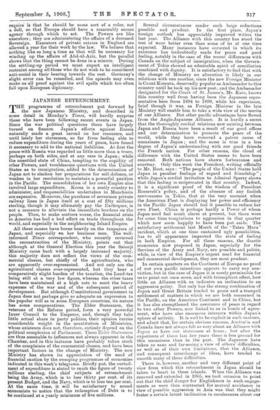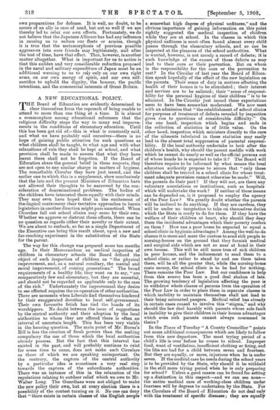JAPANESE RETRENCHMENT.
rE programme of retrenchment put forward by the new Japanese Ministry, and described in some detail- in Monday's Times, will hardly surprise those who have been following recent events in Japan. Since the war political questions there have largely turned on finance. Japan's efforts against Russia naturally made a great inroad on her resources, and until lately her statesmen, so far from feeling able to reduce expenditure during the years of peace, have found it necessary to add to the national liabilities. At first the peace with Russia was regarded as little more than a truce, perhaps on both sides, and at any rate in Japan ; while the unsettled state of China, tempting to the cupidity of other Powers, and troublesome questions with the United States as to immigration, added to the determination of Japan not to slacken her preparations for self-defence, or weaken in her resolution to maintain a powerful position in the Pacific. The consolidation of her own Empire also involved large expenditure. Korea is a costly country to administer, and responsibilities undertaken in Manchuria are expensive. Moreover, the purchase of seventeen private railway lines in Japan itself at a cost of fifty millions sterling, though it may ultimately pay the Exchequer, is not a measure to alleviate the immediate burdens on the people. Then, to make matters worse, the financial crisis iu America has had a bad effect on trade throughout the world, and especially in the neighbouring Island Empire.
All these causes have borne heavily on the taxpayers of Japan,- and especially en her business men. The well- informed Times correspondent, who recently reviewed the reconstruction of the Ministry, points out that although at the General Election this year the Saionji Ministry came back with a largely increased majority, this majority does not reflect the views of the com- mercial classes, but chiefly of the agriculturists, who are apparently over-represented. And not only are the agricultural classes over-represented, but they bear a comparatively slight burden of the taxation, the Land-tax being still at a very low figure, whereas the other taxes have been maintained at a high rate to meet the heavy expenses of the war and of the subsequent period of development. But although Constitutional government in Japan does not perhaps give so adequate an expression to the popular will as in some European countries, its nature has some compensations. The Elder Statesmen, the veterans of the Reform period, form a very powerful Inner Council to the Emperor, and, though they take little actual share in party politics, their opinion carries considerable weight in the constitution of Ministries, whose existence does not, therefore, entirely depend on the political complexion of Parliament. These Elder Statesmen are thus amenable to influences not always apparent in the Chamber, and in this instance have probably taken stock of the complaints of the commercial classes, and have been important factors in the change of Ministry. The new Ministry has, shown its appreciation of the need of financial caution by the sweeping programme of economies indicated in this week's telegrams. Briefly put, the curtail- ment of expenditure is stated to reach the figure of twenty millions sterling, the chief subjects of retrenchment being, the Army, which is to lose thirty per cent. of its Fesent Budget, and the Navy, which is to lose ten per cent. At the same time, it will be satisfactory to sound economists to notice that the redemption of Debt is to be continued at a yearly minimum of five millions. Several circumstances render such large reductions possible and prudent. In the first place, Japan's foreign outlook has appreciably improved within the last year. The Alliance with this country has stood the test of wear better even than some of us at one time expected. Many instances have occurred in which its existence has undoubtedly made for peace and, good feeling, notably in the case of the recent differences with Canada on the subject of immigration, when the Govern- ment of Tokio showed an admirable spirit of conciliation combined with dignity. It is satisfactory to find that with the change of Ministry no alteration is likely in our relations with one another, since the new Foreign Minister is Count Komura, deservedly popular as Ambassador to this country until he took up his new post; and the Ambassador designated for the Court of St. James's, Mr. Kato, knows this country well from having been the Japanese repre- sentative here from 1894 to 1899, while his experience, brief though it was, as Foreign Minister in the late Ministry will enable him to take a wide view of the merits of our Alliance. But other pacific advantages have flowed from the Anglo-Japanese Alliance. It is hardly a secret that the thoroughly cordial relations now existing between Japan and Russia have been a result of our good offices and our determination to promote the peace of the world, while they have removed a patent cause of uneasiness in Japan ; and the same is true in a. less degree of Japan's understanding with our good friends the French nation. For other reasons, the cloud of difference with the United States seems to have been removed. Both nations have shown forbearance and courtesy. Only this week the President, writing officially. to Mr. Root, says : "The people of the United States hold Japan in peculiar feelings of regard and friendship" ; while Japan's cordial invitation to Admiral Sperry shows that this feeling is reciprocated in that country. Indeed, it is a significant proof of the wisdom of President Roosevelt's policy, and of the absence of any foolish nervousness in Tokio, that at the very moment when the American Fleet is displaying her power and efficiency in the Pacific Japan should feel it possible to reduce her own Fleet. China is perhaps hardly a Power of whom Japan need feel much alarm at present, but there were for some time temptations to aggression in that quarter which now seem happily to have been put aside. The satisfactory settlement last March of the Tatsu Meru' incident, which at one time contained ugly possibilities, has to all appearance improved the state of feeling in both Empires. For all these reasons, the drastic economies now proposed in Japan, especially for the Services of the Army and Navy, are possible and politic, while, in view of the Empire's urgent need for financial and commercial development, they are most prudent.
In certain quarters on the Continent of Europe no proof of our own pacific intentions appears to carry any con- viction, but in the case of Japan it is surely permissible for us to point out once more, and with triumphant effect, how little an Alliance with us indicates an inclination to an aggressive policy. Not only has the strong combination of Japan and Great Britain tended to peace and a tranquil settlement of matters in which we are both concerned in the Pacific, on the American Continent and in China, but it has also strengthened the assurance of peace in regard to two other Powers, now linked to us iu bonds of agree- ment, who have also enormous interests within Japan's sphere of activity. It is well to be explicit in such matters, and admit that, for certain obvious reasons, Austi alia and Canada have not always felt so easy about an Alliance with Japan as have our statesmen at home ; but after the experience of these last few years there is less ground for this uneasiness than in the past. The Japanese have taken so sane and far-seeing a view of others' difficulties, as well as of their own limitations, that the Alliance, and consequent interchange of ideas, have tended to smooth many of these difficulties.
There is, however, another and very different point of view from which this retrenchment in Japan should be taken to heart in these islands. When the Alliance was renewed and extended in 1905, we took occasion to point out that the chief danger for Englishmen in such engage- ments as were then contracted for mutual assistance in view of possible aggression in Asia was that they might foster a certain latent inclination to carelessness about our
own preparations for defence. It is well, no doubt, to be secure of an ally in case of need, but not so well if we are thereby led to relax our own efforts. Fortunately, we do not believe that the Japanese Alliance has had any influence in causing us to reduce our fleets or armies, though it is true that the metamorphosis of previous possible aggressors into sure friends may legitimately, and after the test of time, have that effect. That, however, is another matter altogether. What is important for us to notice is that this sudden and very considerable reduction proposed in the naval and military expenditure of Japan must be an additional warning to us to rely only on our own right arms, on our own energy of spirit, and our own self- sacrifice to uphold the dignity, the honour, the pacific intentions, and the commercial interests of Great Britain.







































 Previous page
Previous page